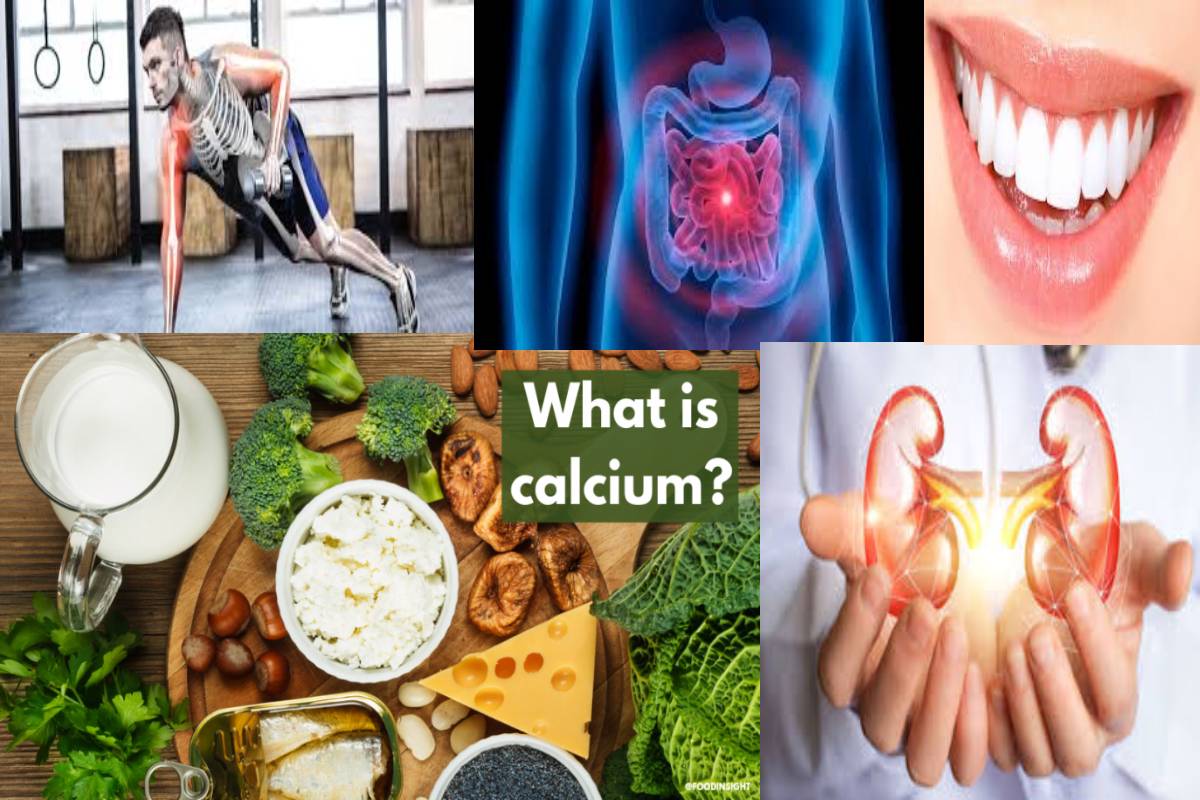Table of Contents
What is Calcium?
Calcium is the richest mineral in the human body and finds in the internal environment as a calcium ion or other molecules.
Essential for its role in the development and maintenance of bones, as well as in the fight against osteoporosis. It is necessary for normal muscle function and for muscle contractions and heartbeat to occur.
It is also essential to maintain the correct state of the membranes and healthy cholesterol levels. Calcium requirements increase in the case of adolescents, the elderly, pregnant, and lactating women.
Due to growth, children also need a large supply of it. During adolescence, a correct supply of this mineral is essential since it is at this stage of life that the most excellent fixation of it in the bone occurs.
What are the Health Benefits of Calcium?
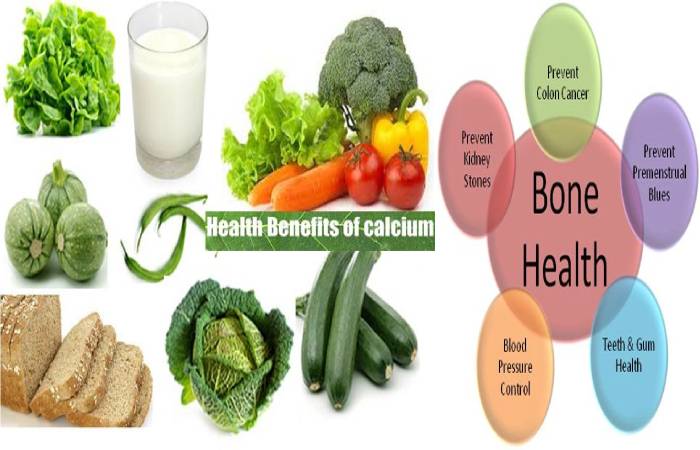
1. Bone Health
- It is beneficial to have strong bones and prevent diseases such as osteoporosis, arthritis, and other conditions that can be very painful and seriously reduce our everyday life.
2. Fight Obesity
- It is also an excellent contribution to prevent obesity in both men and women.
- Because if there is its deficiency in the body, the parathyroid hormone will tend to obesity.
3. Prevention of Cardiovascular Diseases
- The intake of calcium is also essential for preventing cardiovascular diseases since adequate its levels to protect the area’s muscles and improve blood circulation.
4. Weight Loss
- Its deficiency has recently found to hinder weight loss. Although calcium does not directly decrease fat tissue, maintaining adequate levels facilitates weight loss between 25-70%.
- This contribution should be made through diet and strengthened with dietary supplements that contain calcium.
- It recommends supplementing, especially for overweight people preparing to carry out a weight loss plan.
5. Reduction of Plasma Lipids
- It is also capable of lowering LDL (bad) cholesterol levels.
- The mechanism by which it reduces plasma lipid levels is that when it binds with fats and cholesterol inside the intestine, it forms insoluble complexes, increasing its faecal elimination.
6. Physical Activity and Sport
- In addition to its known ability to maintain robust and healthy bones, it plays an essential role in the nerve impulses that trigger muscle contractions.
- An adequate supply of this mineral can stop muscle cramps in athletes and endurance athletes.
- It has observed that athletes who eliminate calcium-rich products from their diets and do not supplement it properly commonly suffer from muscle contraction and cramps.
- The reintroduction of it in their diets reduces its appearance significantly.
- Furthermore, it supplements in endurance athletes have also increased bone mineral density and helped maintain lean (muscle) mass.
What are the Functions of Calcium?
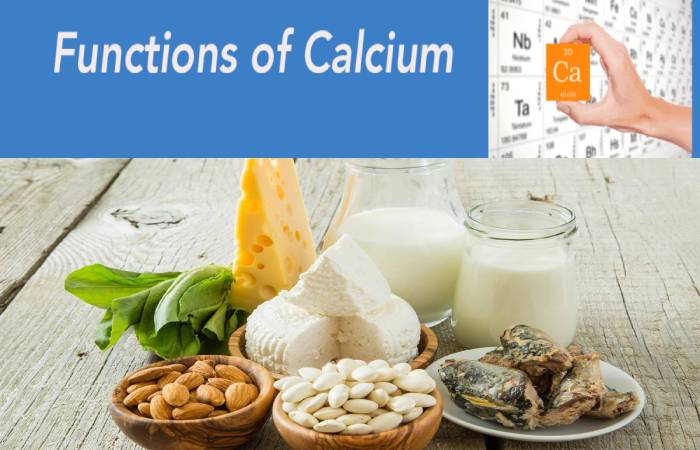
Calcium has various functions in our body:
- It is part of the teeth and bones and helps to keep them healthy.
- It is necessary for blood clotting.
- Calcium participates in the transmission of the nerve impulse.
- It has an essential role in muscle contraction.
- Stimulation of hormonal secretion.
- It contributes to the activation of enzymes that serve as mediators in different chemical reactions.
- It collaborates in cell membranes’ permeability to carry out the exchange of substances with the environment (oxygen and nutrients).
- Calcium participates in the absorption of vitamin B12.
Precautions of Calcium
It is generally safe. However, high amounts (more than 2,500 mg/day) can produce some toxicity and cause constipation, bloating, or gas, but no restrictions or prohibitions have reported.
People with kidney stones or history should consult their doctor before taking dietary supplements with calcium; the same is true for people with hyperparathyroidism or kidney disease.
Also, it can make some antibiotics less effective because they compete for absorption.
Doses of Calcium
The recommended intake has increased from 800 mg/day of calcium to 1000 mg/day in recent years. However, the recommended dose to improve bone mineral density can vary between 500 and 1,500 mg/day, depending on each person’s needs.
It improves absorption. The following guidelines can carry out:
- For better absorption of calcium, it should be taken three times a day with meals to ensure a dose before going to sleep.
- To maintain the human body’s mineral balance, an adequate ratio between calcium and magnesium is necessary. When supplementing the diet with it, magnesium must be added in a 1: 2 ratio (calcium: magnesium).
- Take vitamin D may increase calcium absorption by 65% even with adequate pre levels of Vitamin D.
- Taking lysine (500 to 1,000 mg/day) appears to improve its absorption and retention.
- Calcium and phosphorus are co-dependent for bone growth and development.
What are the Advantages and Disadvantages of Calcium?
- As we have seen, to reach the recommended daily allowance for calcium, supplementation is often required. For women duration 19 to 50 and men 19 to 70, this amount is 1,000 mg per day.
- For women over 50 and men over 70, the amount is 1,200 mg per day.
- It supplementation indicates for cases where the amount ingested is less than the daily needs. For these people, it means the prevention and treatment of osteoporosis.
- Also, it reduces the chances of bone fracture.
- One more benefit of calcium is that it can transmit messages within cells and strengthen bone structure.
- However, several foods provide the necessary calcium for your body.
- Besides milk and dairy products, vegetables like broccoli, fish like sardines and salmon, juices, and fortified foods offer high amounts of it.
- Ideally, take it only on the advice of an endocrinologist or nutritionist. Still, take minimal doses, divided into at least two servings daily.
Advantage
- It prevents osteoporosis.
- It helps strengthen bone structure.
- Some it supplements have other nutrients.
Disadvantages
- Calcium from food is more easily absorbed.
- It can cause digestive problems.
- It increases the risk of kidney stones.
What are the Supplements of Calcium?
It supplements design for people, due to various factors, cannot take foods rich in it. In this way, they can consume the necessary dose of calcium for their body.
These supplements usually take in the following cases :
- For vegans: By following a diet without food from animals, it can be more challenging to include meals.
- With certain digestive diseases (celiac disease)
- Suppose protein consume in high amounts. It makes our body absorb calcium more quickly.
- If you have osteoporosis: bone disease
- For lactose-intolerant people
In any case, whether you are thinking of taking its supplements, the first thing you should do is consult with your doctor or dietitian, and they will tell you if it is appropriate to include them in your diet.
Food Sources for Calcium
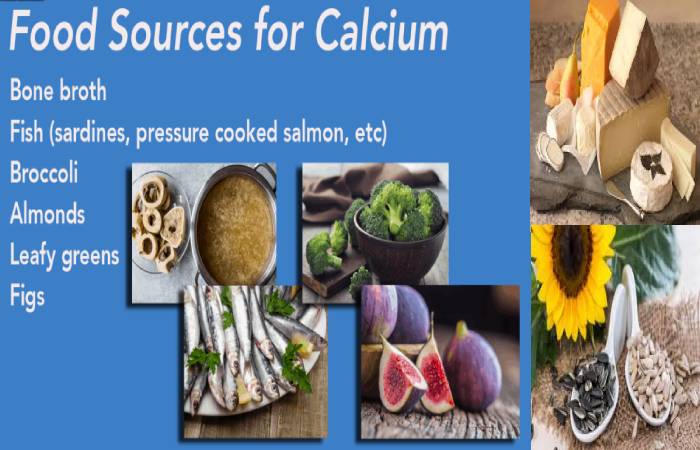 The primary food sources from which to obtain through the diet are:
The primary food sources from which to obtain through the diet are:
- The primary source of it is milk, yoghurt, cheese, and other dairy products.
- Among the cheeses, the Gruyère, Emmental, Manchego, Burgos or Roquefort stand out.
- Fish from which you can eat the bones (sardines, anchovies, salmon), shellfish (prawns, crayfish, prawns).
- Green leafy vegetables (collards)
- Sunflower seeds.
- Born broth
- Legumes (legumes, soybeans, chickpeas, green beans, broad beans)
- Peanuts, almonds, hazelnuts, pistachios, and to a lesser extent dried figs, walnuts, dates, or raisins
- Water for consumption.
Deficiency of Calcium
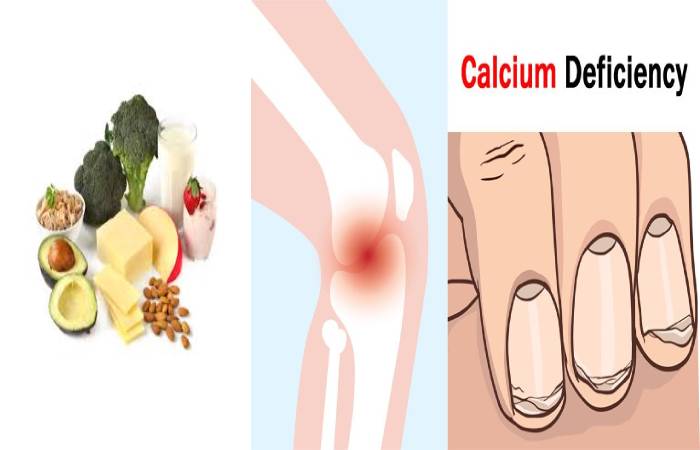
The lack of calcium necessary for the proper functioning of our body can cause:
- Osteoporosis: decrease in bone mass and increased brittleness of bones.
- Rickets: low mineralization and bone deformity.
- Tetany: alteration in muscle contraction.
- Calcium toxicity
- Increased calcium in the blood and urine
- Extra-osseous calcium deposits.
Although a balanced diet helps it be absorbed, increased protein and sodium (salt) in the diet think to cause the kidneys to remove more calcium. For this reason, excessive intake of these substances should be avoided, especially in those who consume little calcium.
Lactose intolerance can also result in inadequate calcium intake. Lactose intolerant people do not have sufficient amounts of the enzyme lactase necessary for the breakdown of lactose found in dairy products.
To include dairy products in the diet, you can: consume these foods in small amounts, add drops of lactase or take lactase in pill form. There are also some dairy products on the market to which lactase has already add.
Conclusion
It is an essential mineral that plays a central role in bone health.
There are some calcium supplements on the market, each of which varies based on the kind of it, dosage, and ingredients it contains.
When choosing it to supplement, be sure to consider all of these factors and look for products that have undergone third-party testing to ensure that you’re getting the highest quality possible.
Also Read: Tea Tree Oil – Definition, Properties, Benefits, Causes, Uses, and More

